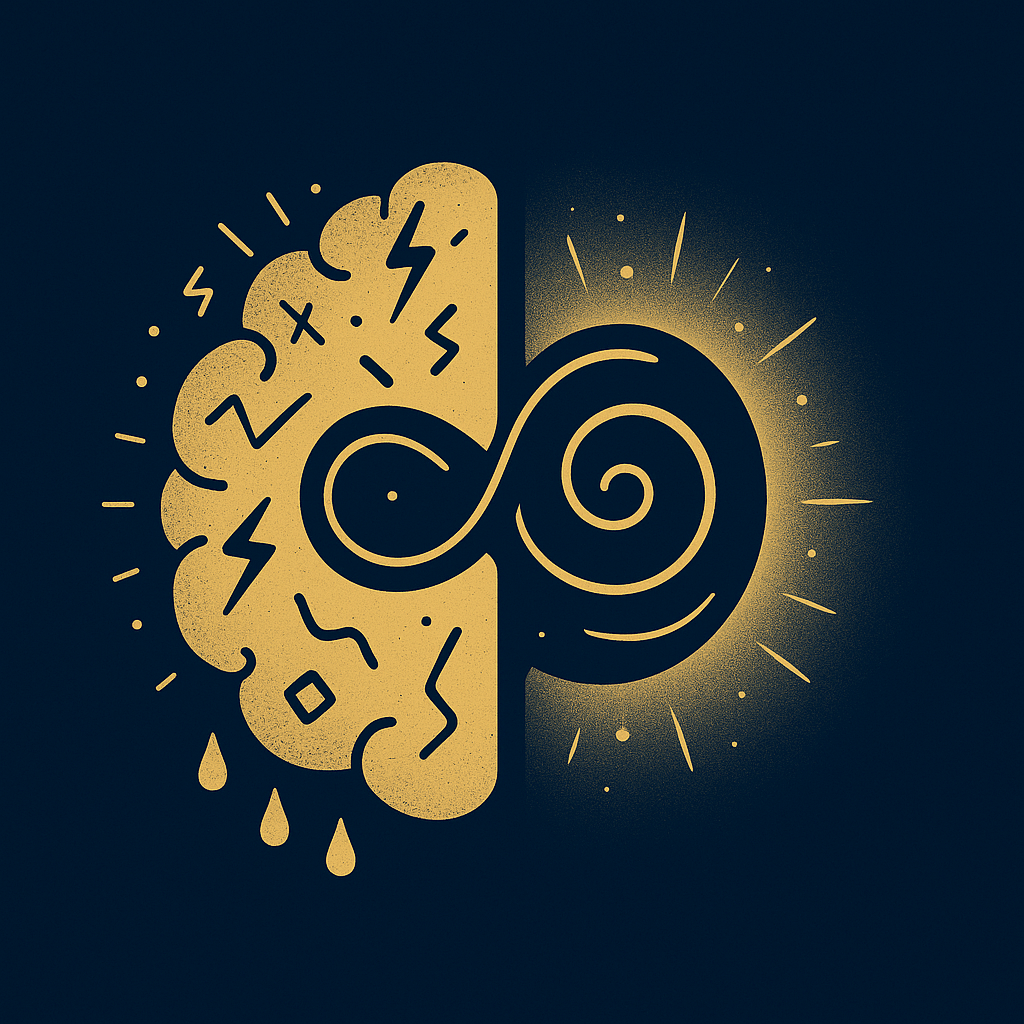A few weeks ago, during a coaching session, a client confided something that still echoes in my mind: “I feel like my brain never stops. Even when I sleep, I dream about my to-do list.”
This confession—I’ve heard it in different forms over the fifteen years I’ve been coaching people in their quest for organization and productivity. Behind every request for time optimization lies a deeper cry: “Help me find mental peace.”
Because here’s a truth few dare to admit: it’s absolutely impossible to be more productive, manage your time better, or have more energy if we can’t escape this invisible trap plaguing our era—mental overload.
Today, I want to share with you not only practical solutions to this modern plague, but most importantly, a new way of conceiving your relationship with responsibility, action, and serenity. An approach that honors your authentic nature rather than forcing you into a productivity mold.
The Saturated Hard Drive Metaphor: When the Mind Overflows
Let me take you back a few years, to the era of early personal computers. Do you remember that frustration when your hard drive was so cluttered that everything slowed down? You had to do what we called “defragmentation”—reorganizing scattered data to restore fluidity and performance.
Our minds work exactly the same way. When saturated with responsibilities, projects, ruminations, and pending decisions, they start to “lag.” This saturation creates what I call the “open drawers” effect: as if you had simultaneously opened dozens of files in your mental space, creating chaos where everything mingles and nothing finds its place.
The Modern Anatomy of Overload
Mental load is when you have so many things to think about that you forget to think about yourself. You lose yourself in the ocean of your responsibilities—professional, family, social—until you can no longer distinguish what’s truly essential from what’s simply noisy.
This overload takes a thousand forms:
- The entrepreneur who single-handedly carries all strategic decisions for their business
- The working parent who coordinates everyone’s schedules without anyone thinking of theirs
- The manager who anticipates all their team’s problems before they even appear
- The perfectionist who ruminates over every detail of every project until exhaustion
In all cases, the symptom remains the same: a mind that never finds rest, even in moments meant for relaxation.
The Invisible Devastation: When Load Becomes Burden
I speak of this subject with such urgency because I’ve witnessed the damage that chronic mental overload can cause. It never stays confined to your organizational sphere—it gradually invades every aspect of your existence.
The Exhaustion That Doesn’t Name Itself
Unlike physical fatigue, which is easily identifiable, mental fatigue is insidious. It doesn’t always manifest as an obvious sense of tiredness. It creeps into your daily life as unexplained irritability, unusual forgetfulness, difficulty making the simplest decisions.
I’ve coached brilliant executives who had lost their ability to choose a restaurant for lunch, their decision-making energy so depleted by professional challenges. This “decision fatigue” becomes a vicious cycle: the more mentally tired you are, the more each choice costs you, the more you exhaust yourself.
The Theft of Your Presence
But most tragically, mental overload steals your ability to be fully present in moments that matter. You’re physically on vacation, but mentally still at the office. You’re dining with family, but your mind is already planning tomorrow’s meeting.
This fragmentation of attention doesn’t just steal your efficiency—it steals your joy of living. How can you savor a sunset when your brain is scrolling through pending emails?
The Path to Liberation: Five Pillars for Reclaiming Serenity
After fifteen years of coaching and personal experimentation, I’ve identified five fundamental pillars for transforming this paralyzing mental load into creative energy. These principles aren’t mechanical techniques, but invitations to rethink your relationship with action and responsibility.
First Pillar: The Art of Mental Liberation
Your brain isn’t designed to be a hard drive. It’s built to create, analyze, innovate—not to store information or pending tasks. The first revolution consists of systematically externalizing everything that can be externalized.
This liberation happens through simple but revolutionary gestures:
- Immediately capturing every idea, commitment, or concern that crosses your mind
- Using note-taking tools adapted to your personality (notebook, app, voice recordings)
- Practicing journaling to evacuate the ruminations and emotions that clutter your mind
The goal isn’t to create a complex system, but to develop a reflex of “mental clearing” that keeps your mind available for what truly matters.
Second Pillar: The Wisdom of Intuitive Prioritization
Faced with modern solicitations’ abundance, learning to prioritize becomes an act of wisdom, not just productivity. But careful: I’m not talking about complicated matrices or rigid systems that add complexity to your life.
I’m talking about developing what I call your internal “priority compass”—this ability to quickly sense what deserves your attention and what can wait. This compass calibrates by systematically asking yourself three questions:
- “Is this really worth my concern right now?”
- “What would be the real consequences if I don’t do this today?”
- “Is this aligned with what truly matters to me?”
The more you develop this rapid discernment ability, the less you get bogged down in false urgencies that pollute your mental space.
Third Pillar: The Support Ecosystem
You weren’t meant to carry the weight of all your responsibilities alone. One of our era’s greatest misunderstandings is the belief that personal efficiency means managing everything by yourself.
True mastery consists of building an ecosystem of tools, systems, and collaborations that carry part of the load with you:
- Calendar and planning systems that think for you
- Automations for recurring tasks
- Intelligent delegation of responsibilities that can be delegated
- Active collaboration with your professional and personal circle
The art isn’t to control everything, but to create an environment that naturally supports you.
Fourth Pillar: Regeneration Rituals
Here’s a truth our performance culture has forgotten: your brain needs emptiness to create fullness. Without regular decompression spaces, you accumulate mental fatigue that eventually explodes.
Regeneration rituals aren’t wasted time—they’re the most profitable investment you can make. An hour of walking that resets your mind will make you more creative and efficient than three hours spent forcing in a state of saturation.
Examples of regenerative rituals:
- Physical activities that completely disconnect from the mental (sports, walking, gardening)
- Contemplative practices (meditation, reading, music)
- Moments of pure creativity (drawing, cooking, crafting)
The secret: choose activities that truly nourish you, not those you “should” do according to social standards.
Fifth Pillar: Liberating Assertiveness
Here’s perhaps the most difficult but also most liberating pillar: learning to consciously filter what deserves to enter your mental space. This ability requires developing what I call “benevolent assertiveness.”
This involves:
- Knowing how to say no to solicitations not aligned with your priorities
- Empowering your circle rather than carrying their problems
- Creating clear boundaries between your mental space and others’ urgencies
- Filtering information you consume daily
This assertiveness isn’t selfishness—it’s mental ecology. You can only give your best when you preserve your most precious resource: your mental clarity.
The Profound Transformation: Beyond Technique
Working on these five pillars creates something deeper than simple organizational improvement. You begin developing what I call a “conscious relationship” with your responsibilities.
From Suffering to Choice
Instead of enduring your mental load as fate, you learn to consciously choreograph it. This transition from suffering to choice transforms your daily experience. You shift from “I must manage everything” to “I consciously choose what I carry and how I carry it.”
From Exhaustion to Energy
Paradoxically, the less you force your mental capacity, the more creative energy you release. By stopping the waste of attention on a thousand details, you concentrate it on what truly generates impact and joy.
From Isolation to Ecosystem
You realize that true efficiency isn’t a solitary feat, but a collaborative dance with your environment. This awareness transforms your relationship with control and delegation.
Your New Relationship with Mental Load
Mental load will never completely disappear from your life—and that’s normal. The goal isn’t to live in permanent mental void, but to develop your ability to process it quickly and consciously.
Imagine your mind as a river rather than a lake. In a river, water flows constantly—it never stagnates. Your concerns, responsibilities, and projects can traverse it, but they don’t accumulate indefinitely.
This mental fluidity becomes your new standard. Instead of carrying the world’s weight on your shoulders, you learn to dance with it.
The 30-Day Challenge
If this message resonates with you, I invite you to a simple but powerful challenge: choose just one of the five pillars and experiment with it for 30 days.
- If you choose mental liberation: Establish a daily 10-minute “mental clearing” ritual
- If you choose prioritization: Practice the three discernment questions before each decision
- If you choose ecosystem: Identify one responsibility you can delegate or automate
- If you choose regeneration: Integrate a daily moment that truly nourishes your energy
- If you choose assertiveness: Practice one benevolent “no” per day to what doesn’t serve your priorities
Observe not only the impact on your organization, but especially on your sense of serenity and daily joy.
Toward a New Philosophy of Action
As I close this reflection, I’d like to share a deep conviction: mental load isn’t just an organizational problem to solve—it’s an invitation to rethink your relationship with existence.
In an era that values accumulation—of experiences, responsibilities, possessions, connections—learning to manage your mental load is learning the art of conscious subtraction. It’s understanding that life’s richness isn’t measured by what it contains, but by the quality of presence you can bring to it.
Your liberated mind isn’t a luxury—it’s the very condition of your fulfillment and authentic contribution to the world.
This transformation awaits you. It begins with a simple choice: treating your mental peace not as an optional bonus, but as the foundation upon which to build a life that truly reflects who you are.
Breathe. Your brain deserves this rest. Your heart deserves this lightness. Your life deserves this clarity.
💌 Loved this ? Share & Subscribe to the newsletter…

